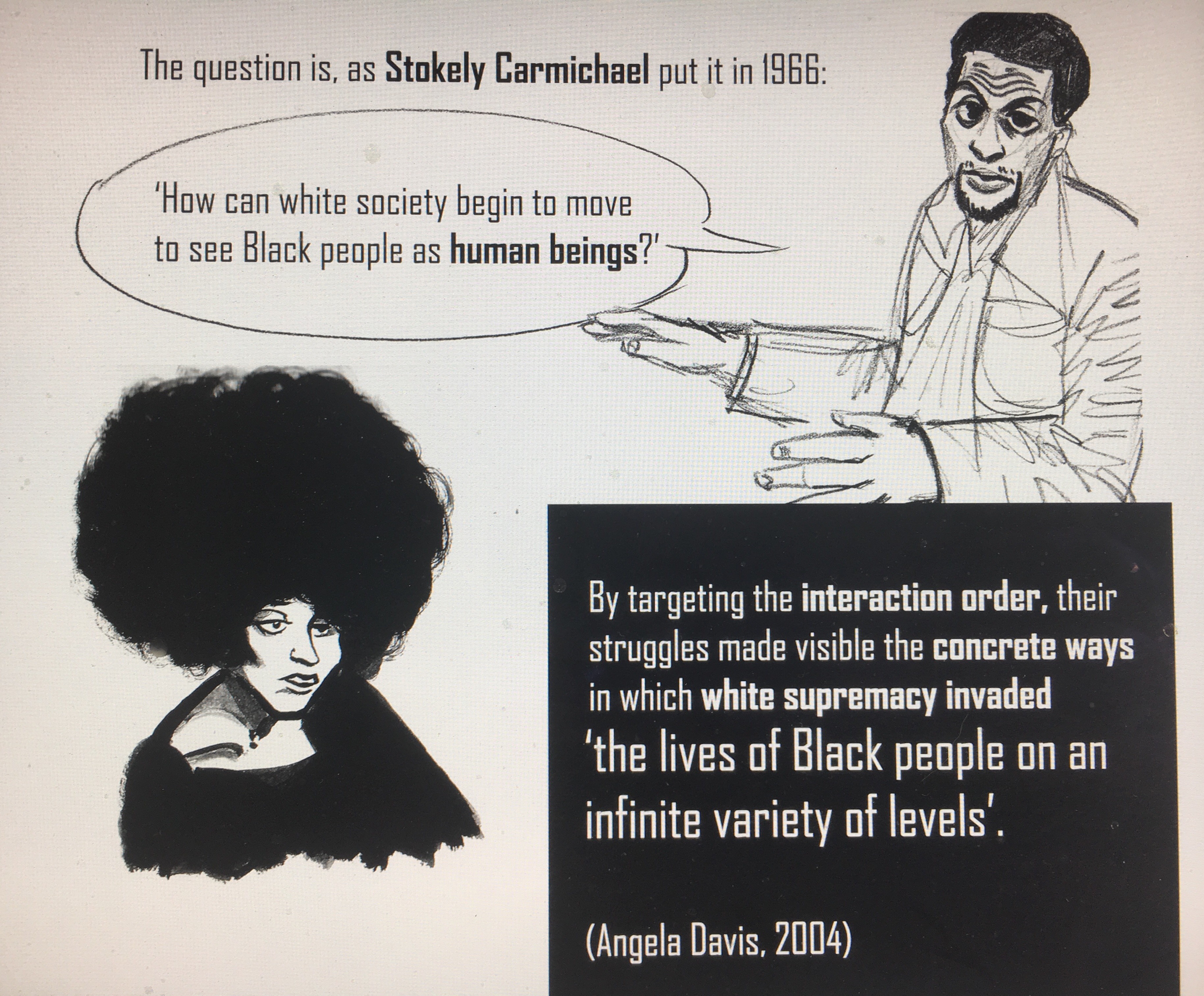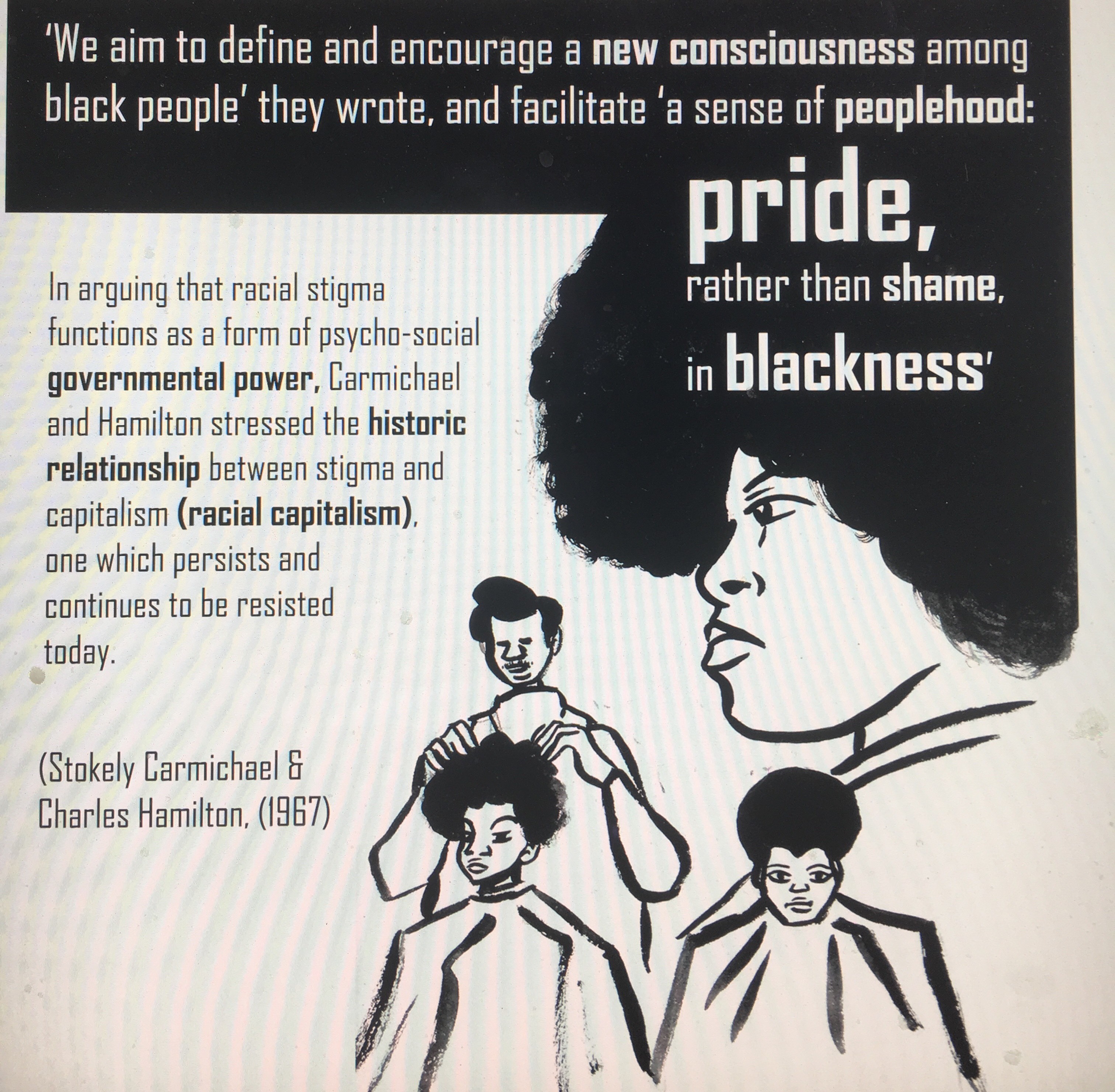 Please note copyright ©Charlotte Bailey images & @ImogenTyler words. Please do not reproduce any images from this page without proper citation: Charlotte Bailey & Imogen Tyler, 2018 “From Stigma Power to Black Power” Graphic Essay.
Please note copyright ©Charlotte Bailey images & @ImogenTyler words. Please do not reproduce any images from this page without proper citation: Charlotte Bailey & Imogen Tyler, 2018 “From Stigma Power to Black Power” Graphic Essay.
One of the outcomes of my research project on stigma is a collaboration with the graphic artist Charlotte Bailey . Together we have been transforming my article on Goffman – a paper which puts Goffman’s stigma concept into critical dialogue with Black Sociological and Political thought (mainly but not only from the US) .
Charlotte has been interpreting my essay visually through her ink drawings- and I have been working on the words, and “the story” the essay tells. The final version of our graphic essay will be available to download for free (but please make sure to credit the artist and writer when distributing!). It will also be available to buy in a limited edition paper copy (when we have worked out the best way to publish it).
One of things which has guided our collaboration is a concern with making rich historical lines of Black critical thought about stigma visible. The original essay attempts to do this through its citational politics – a very long list of references is intended both as a resource for others, and to make a statement about how Black thinking continues to be ignored and marginalised. Indeed, one of the main arguments I make is that despite the sophisticated understanding of racial stigma developed over a hundred years of black sociological thought, the conceptualisation of stigma in sociology has largely been ‘structured by the absence of an address’ to this tradition (Bhambra, 2014, p. 12).* This is why in seeking to historically resituate Goffman’s original account, I drew on such a long and wide range of interlocutors working in a Black critical, political and sociological tradition, including: Mario Biondi, James Boggs, Stokley Carmichael, Patricia Hill Collins, Angela Davis, Kimberley Dotson, W.E.B. Du Bois, Roderick Ferguson, Frantz Fanon, the Greensboro Four, Paul Gilroy, Lewis Gordon, Charles Hamilton, Harry Haywood, Robin Kelley, Joyce Lamont, Manning Marable, Zine Magubane, Anne Moody, Cedric Robinson, Hortense Spillers, Cornell West, Patricia Williams and Gary Younge. One of the many things which has been wonderful things about working with Charlotte is how she has animated these Black thinkers through her ink drawings.

The account of racism as stigma which emerges through this Black genealogy of stigma-thinking challenges the individualism of psychological approaches to social problems, exposes the limits of “white normative perspectives”, and troubles “race neutral” forms of interactional analysis. What this graphic essay also seeks to highlight are existing rich historical, political and economic conceptualisations of stigma as technologies of dehumanisation, stigma as forms of power which have been collectively resisted from below.
For example, of central importance to Black freedom struggles was (and continues to be) Carmichael and Hamilton’s anti-stigma concept of ‘Black Power’ which reconfigured racial stigma into ‘a revolutionary emotion’:

We hope this graphic essay will help bring racism and anti-racist scholarship and (activism) to the front and centre of sociological understandings of stigma.
*(I am glad to report that more recent scholarship suggests a new sociological interest in the relationship between racism, stigma and power: see Loury, 2003; Howarth, 2006; Matory, 2015; Lamont et. al., 2016).
Please note copyright ©Charlotte Bailey images & @ImogenTyler words. Please do not reproduce any images from this page without proper citation: Charlotte Bailey & Imogen Tyler, 2018 “From Stigma Power to Black Power” Graphic Essay.